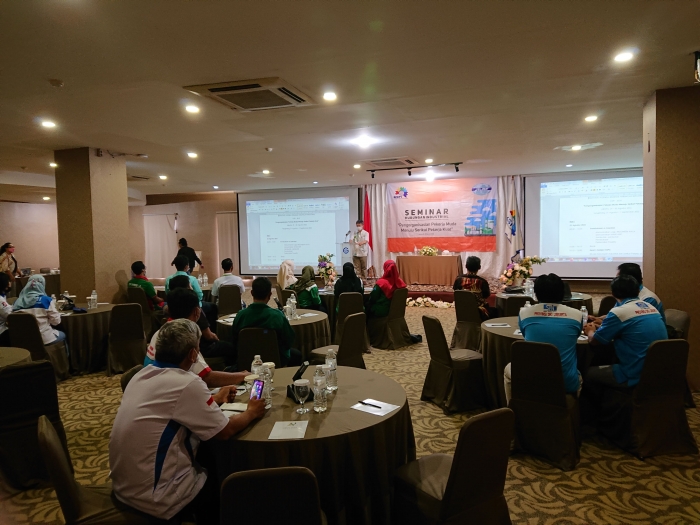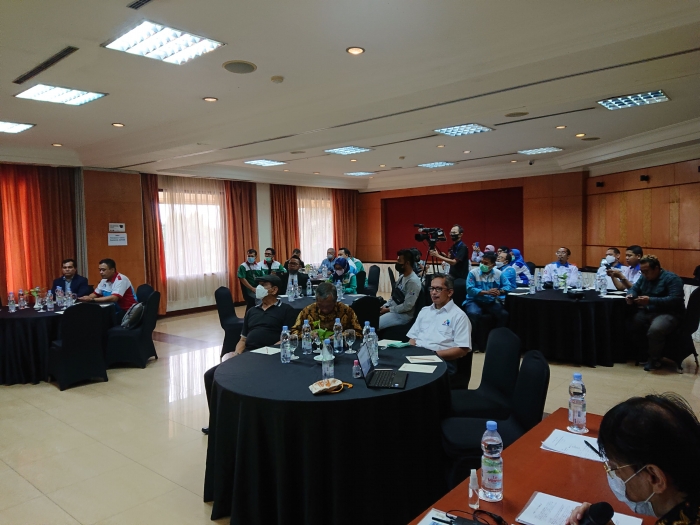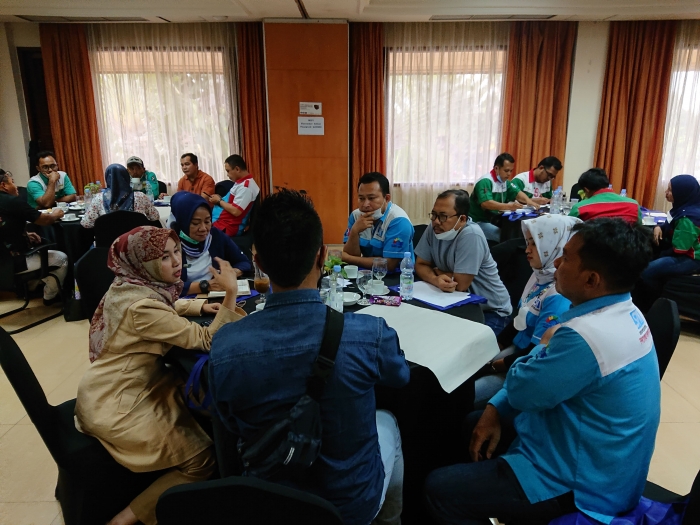CITU/JILAF Seminars on Industrial Relations and Labour Policy for Indonesia
From August 29-30 and August 31-September 1, JILAF, together with the Confederation of Indonesian Trade Unions (CITU), held seminars on industrial relations and labour policy in the Indonesian cities of Central Jakarta and Serang in Banten Province. The seminars were attended by a total of 60 people, including the leaders of each member organization.
At the beginning of the seminars, the national anthem and union anthem were sung in unison, then CITU General Secretary Ramidi Abdul Madjid and JILAF Executive Director Takayuki Yagi gave opening addresses, and shared the purpose and objectives of the seminars with all participants.
Following this, in a lecture titled “The Current State of Indonesia’s Industrial Relations and Trade Unions,” General Secretary Ramidi explained, “Indonesia’s average wages are among the lowest in ASEAN countries, and there are about seven million people unemployed. The rate of application for social insurance is also low, and the current situation is one where there is no stable employment, no stable income, and no social protection. Amidst such circumstances, the rate of organization of trade unions is on a downward trend, and as of 2021, stands at around 12%. Notably, the number of CITU union members, which peaked at about 1.78 million in 2017, has now declined to about 600,000.” After this, General Secretary Ramidi then stated that the priority objectives for the next five years should be to 1) increase wages, 2) enhance social insurance, 3) expand organizations, and 4) promote the involvement of young people, etc.
Next, Executive Director Yagi gave a lecture on (1) Japan’s collective bargaining and labour-management consultations, (2) RENGO’s organization efforts, and (3) RENGO’s response to ambiguous employment, centered on “Wor-Q.” In response, participants asked how trade unions should engage in collective bargaining under circumstances where working conditions are likely to be lowered, how trade unions should put effort into labour-management consultations and collective bargaining, and whether there is cooperation between RENGO and the labour and management of Japanese enterprises, among other questions, to which JILAF answered as appropriate.
In the panel discussion that followed, employers’ organizations, trade unions, and JILAF each spoke on the topic of “what should be done now to create strong trade unions.” Notably, a representative of Asosiasi Pengusaha Indonesia (APINDO) shared their experience of visiting the JILAF headquarters a few years ago and exchanging opinions, stating, “We need to create jobs based on the Omnibus Law. The Omnibus Law not only contains changes that are detrimental to workers, but also changes that are beneficial to them. Going forward, the government, labour and management should thoroughly check whether the Omnibus Law is effective or not by looking at trends in investment and employment. At the same time, it is also important to conclude labour agreements through corporate level labour-management consultations that are not bound by the Omnibus Law. In Japan, I learned that labour and management have discussions from the management planning stage, where they determine the profits and the distribution thereof. In any case, it is important to build a readiness to engage in bipartite consultations at the corporate level and to raise awareness for that purpose. This awareness is necessary not only among workers but also management. Trade union activities have some benefits for employers as well, so this should be emphasized in campaigns.”
On the second day of the seminars, CITU spoke about “access to worker protection and social insurance as a right of all workers.” They explained that the current state of the social insurance system is one where the rate of application among informal sector workers is 0.2%, and even that of formal sector workers remains at 38.5%. They also stressed
that trade unions need to not only actively participate in government-labour-management consultations aimed at improving inadequacies in the system design, but to also work on raising awareness among workers.
In addition, representatives of industrial unions affiliated with CITU gave a lecture on the “significance of trade unions organizing women and young workers.” Regarding the purpose and key points of organization, the representatives touched on the ILO’s core labour standards, stating, “Organization does not simply refer to efforts to increase union members, but instead to revitalize all union members, including those who already exist. A situation where only a specific set of people continue to run an organization as executives is far from revitalization. Executives today must always be mindful to train the next generation. Also, a democratic organization is one that does not discriminate. In order to organize women, it is important to conclude a labour agreement on the protection of women. We need to recognize that women’s issues do not only belong to women, but to us all.”
At the closing ceremonies for the seminars, Executive Director Yagi expressed, “I would like you all to make use of what you have learned here in your workplace. Constructive industrial relations are not something that can be built overnight, but I hope that you will all work hard to achieve this by all means.” Following this, CITU Vice President Ali Akbar Fazlurahman then closed the seminars by stating, “The status of workers in Indonesia is declining. I would therefore like for each local trade union to use their creativity to boost their activities in building industrial relations, organizing workers, and other such initiatives.”



